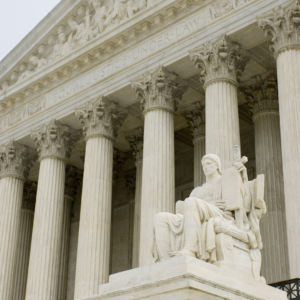A lawsuit challenging mandatory union dues lost in court Tuesday opening the door to a potential move to the U.S. Supreme Court.
Lead plaintiff Mark Janus filed the lawsuit alongside two other Illinois state workers. The lawsuit argues that mandatory union fees in the public-sector are a violation of the first amendment. The Seventh Circuit Court of Appeals ruled against the lawsuit by affirming an earlier district court decision.
The lawsuit ultimately hopes to overturn a prior Supreme Court case known as Abood v. Detroit Board of Education. The case affirmed mandatory dues when it was ruled in 1977. The appeals court rejected the lawsuit, noting it cannot overrule a decision from the Supreme Court.
“Janus’s claim was also properly dismissed,” the decision stated. “He failed to state a valid claim because, as we said earlier, neither the district court nor this court can overrule Abood, and it is Abood that stands in the way of his claim. The judgment of the district court dismissing the complaint is therefore affirmed.”
The lawsuit is directed at the American Federation of State, County and Municipal Employees (AFSCME). The plaintiffs can now petition the Supreme Court to take the case. The National Right to Work Legal Defense Foundation (NRTW) has been assisting the state workers in partnership with the Liberty Justice Center (LJC).
“The court’s ruling is no surprise but simply allows the next step forward in the journey to end forced unionism for public employees across the country,” NRTW President Mark Mix said in a statement provided to InsideSources. “No one should be forced to pay union dues or fees just for the privilege of working for their own government, and this decision means the case can now move up to the United States Supreme Court.”
Labor unions and their supporters argue that optional dues encourage workers to free-ride. Once a union gets voted in as an exclusive representative, it must represent all workers whether they pay dues or not. The free-ride argument is used against both lawsuits challenging mandatory union payments and right-to-work laws.
Labor unions have a lot to lose if the lawsuit ends mandatory union dues in the public-sector. The Bureau of Labor Statistics (BLS) reported that the union membership rate stands at 34.4 percent for public-sector workers, but only 6.4 percent for private.
Friedrichs v. California Teachers Association dealt with an identical challenge but failed last year. The Supreme Court became split after the death of Justice Antonin Scalia. A tied decision defaults to the lower courts. Judge Neil Gorsuch is currently going through the confirmation process to fill the empty seat.
The appeals court heard oral arguments for the case March 1. The justices might pick up the case as early as this year depending on whether they want to litigate it. The Supreme Court tends to be hesitant to overturn past cases but this time could be different since they never had a chance to decide Friedrichs.
AFSCME and its local affiliate did not respond to requests for comment by InsideSources.

